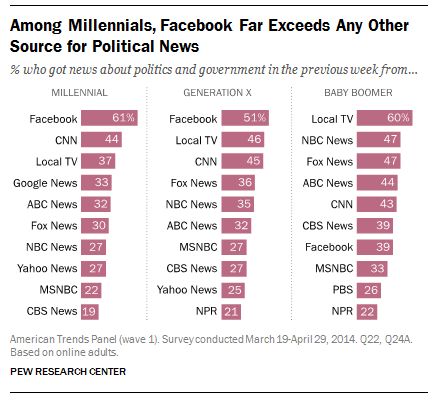Facebook: America's Number One Trusted Source for News?

Pew Research released the results of an online poll of over 2,000 Americans Monday that offers new insight into how Americans get their news. The study found:
When it comes to where younger Americans get news about politics and government, social media look to be the local TV of the Millennial generation. About six-in-ten online Millennials (61%) report getting political news on Facebook in a given week, a much larger percentage than turn to any other news source
In addition, a majority of Americans aged 19-49 reported getting their news from Facebook in the last week, which includes both Millennials and Generation Xers. Nearly 40 percent of online Baby Boomers (those aged 50-68) reported getting their news from Facebook as well. If the trend continues, the ten-year-old social media platform may well become the US's #1 source for news.
Since Facebook itself isn't a news organization, the findings suggest that more and more Americans rely on the news that their friends share as opposed to what any one particular news source deems important. In addition, whatever story ends up trending in the social media zeitgeist will be much more likely to permeate through the 19-49 crowd.
Findings in another study published in May suggest that a person's Facebook friends can play the biggest role in deciding what kinds of news a Facebook user is exposed to, whether it be liberal, conservative, or somewhere inbetween.
Interestingly, only 26 percent of Millennials reported having politics in their top three interests -- compared to 34 percent of Gen Xers and 45 percent of Boomers. However, it would seem the younger Facebook user is more likely to see political news and views that don't always align with their own.
Pew has the full report:
At the same time, while most Facebook users who pay attention to political content do, in fact, see views on the site that aren’t in line with their own, Baby Boomers are the most likely to see political content on Facebook that supports their own views: 31% of Baby Boomers on Facebook who pay attention to political posts say the posts they see are mostly or always in line with their own views, higher than both Gen Xers (21%) and Millennials (18%). But, as discussed above, Baby Boomers are the least reliant on this platform as a source for political news. The findings comport with our earlier research on Facebook and news, which revealed that younger users get news on Facebook at greater proportions than older users, and tend to use it for a wider range of activities. Millennials, in other words, are more apt to turn to Facebook as a way to keep up with what is going on, day in and day out. In doing so, part of what they see is news – even more so than older users who have more dedicated news habits outside of Facebook.
Photo Credit: Twin Design / Shutterstock.com



